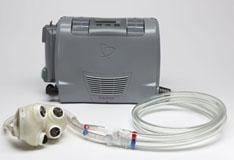
March 30, 2010 – The FDA granted an investigational device exemption (IDE) for a clinical study of the Freedom portable driver system to power SynCardia's Total Artificial Heart. The study is designed to demonstrate that stable Total Artificial Heart patients in the U.S. can manage their portable driver outside the hospital environment, including at home and in step-down facilities.
While the Total Artificial Heart has the one of the highest bridge to transplant rates of all approved mechanical circulatory support devices, the major drawback is it confines patients to the hospital while they await a transplant. This is because the only FDA-approved driver for powering the device is the 418-pound hospital driver nicknamed “Big Blue.” Patients who meet study criteria will have the option to be discharged from the hospital with the Freedom driver, with the goal of enabling them to resume normal activities. The portable driver weighs 13.5-pounds, which includes two onboard lithium-ion batteries and a power adaptor. It is carried by the patient in a backpack or shoulder bag.
“While waiting for a transplant, patients can stay in the hospital for several months and in some rare cases, more than a year,” said Dr. Stephen Clayson, associate surgical director of the Utah Artificial Heart Program at Intermountain Medical Center. “We are pleased to initiate the IDE clinical study and evaluate the use of the Freedom driver to power the Total Artificial Heart. If the IDE clinical study of the Freedom driver is successful, patients will be able to sleep in their own bed, spend time with their families and be more self-sufficient.”
The study is designed to demonstrate that the driver is a suitable pneumatic driver for stable artificial heart patients and can be used safely at home. The trial is expected to enroll 60 patients and will follow them until transplant, 90 days after discharge or death. Centers anticipated to participate in the study include University Medical Center at the University of Arizona, Intermountain Medical Center and Virginia Commonwealth University Medical Center.
The Freedom driver uses a “dark cockpit” design, meaning the driver only flashes a light and sounds an alarm when something requires the user’s attention. The Freedom driver is serviced by replacement via express delivery. No onsite repair or inventory of parts is required by the hospital.
On March 1 the Freedom driver received CE approval for use in Europe.
For more information: www.syncardia.com


 January 05, 2026
January 05, 2026 









